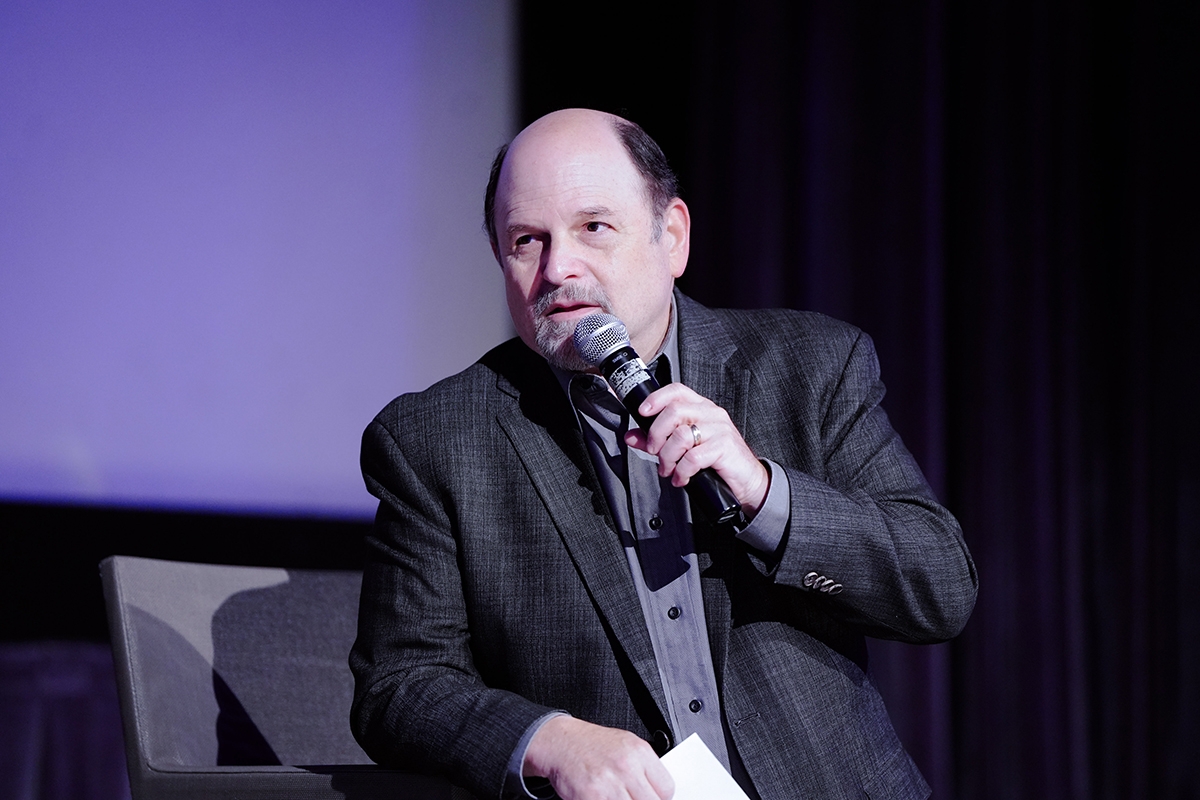Last month, Ohad Munder-Zichri turned 9. The occasion was celebrated by children all over the country with cake, balloons, candy and banners — but missing from the celebrations was the birthday boy himself. On October 7, Ohad was taken hostage by Hamas, kidnapped from the home of his grandparents Avraham and Ruti Munder in Kibbutz Nir Oz, along with them and his mother Keren. His uncle was killed during the attack.
Now, actor Jason Alexander is sharing Ohad’s story, calling for his release. In a video shared on social media, the Jewish actor, best known for playing George Costanza in “Seinfeld,” shared a photo of himself at age 9, wearing a suit and tie. He then swiped through to a picture of Ohad, with his glasses and backwards cap, looking into the camera.
“Today, I will be his voice,” Alexander tells the camera, and then speaks on behalf of the young boy: “Hi, I’m Ohad. I’m 9 years old. I’m a football player. I have two best friends, but I enjoy getting along with everyone and helping out, especially my soccer coach Noam, when he needs help. I don’t like to brag, but I’m really good at solving Rubik’s cubes. I wait every day to hug my father and to go back home. Please set me free.”
“On behalf of Ohad, I am asking you, please, please set him free now, send him home, bring him home,” a visibly emotional Alexander tells the camera.
Thank you, @IJasonAlexander, for lending your voice on behalf of Israeli hostages held in #Gaza by Hamas terrorists.#BringThemHome pic.twitter.com/U4YAsVj14s
— Embassy of Israel to the USA (@IsraelinUSA) November 18, 2023
Alexander recently directed the play “If I Forget,” about Holocaust remembrance and Israel’s place in Jewish identity in America. He has also been involved with the organization OneVoice in the past, which encourages moderate voices on the Palestinian-Israeli conflict in hopes of bringing lasting peace to the region. He was brought into the organization by Daniel Lubetzky, his friend and the founder of Kind bars.
He has visited Israel and Palestine as part of that work, and even attended talks at the Israeli Knesset.
“There’s incredible suffering going on over there,” he said about visiting Palestinian territories in a talk in 2012. “It’s very hard for an American Jew to get into certain parts of Palestine.” He also talked about visiting the Israeli town of Sderot. “They get missiles a lot, 300 times a year, there’s a siren that goes and you have 10 seconds to get to the shelter,” he said, adding, “the whole city suffers from post traumatic stress disorder.”
Alexander said that he believes that there is hate and animosity on both sides, as well as a wish for peace. “Both sides want the same things, they want peace… the leadership on both sides is a failure,” he said, adding that, “the moderates believe that they don’t have anybody to talk to on the other side.”
“I love the region,” he professed in 2012. “If we could settle it, the world would change in a significant way. It should be our number one foreign policy focus, and who knows, maybe it will be.”
In that same conversation, Alexander said that it was Arab Israeli politician Mohammad Darawshe, who co-founded OneVoice with Lubetzky, who convinced him to join the organization by talking about how his soccer-loving son told him he wanted to be a martyr when he grew up. He asked Alexander to help him make sure that never comes to bear.
Tragically, Darawshe was very intimately hit by the October 7 attack. His cousin, Awad, 23, was a paramedic who worked at the Supernova Party and was killed by Hamas while he was bandaging one of the wounded party attendees.
“He said, ‘No, I’m not leaving. I speak Arabic, I think I can manage,’” Mohammad Darawshe told the AP about his cousin’s bravery that dreadful day.
“He brought us a lot of pain, he brought us a lot of agony, he brought us a lot of sorrow,” Darawshe said about Awad’s loss. “But he also brought us a lot of pride — because he chose to stay with his mission until the last moment.”
Just like Darawshe, Avi Zichri, Ohad’s father, is in terrible pain, though he still has hope. He was not with his son and wife that Saturday morning in Kibbutz Nir Oz, having stayed in their home in the Israeli city of Kfar Saba. His wife, Keren, wrote to him early Saturday morning telling him they were going to the safe room, where young Ohad watched TV quietly as the gunfire blazed outside. She told him she hopes no one was harmed, and asked him to take care of himself. Soon, the messages and phone calls stopped coming.
“I keep imagining what he is going through. He’s a sensitive boy. Did he see dead bodies? He wears glasses. Did they take them from him? Can he see anything?” Zichri told the AP on Ohad’s birthday.
“I keep having these horrible thoughts about how they’re surviving there,” he told Walla News, saying that his father-in-law is reliant on a walker. He said that he cannot sleep at night and has to take sleeping pills to knock himself out.
“And then I wake up in the morning and feel guilty for not thinking about them in my sleep.”
We pray that Ohad is reunited with his loved ones soon.








